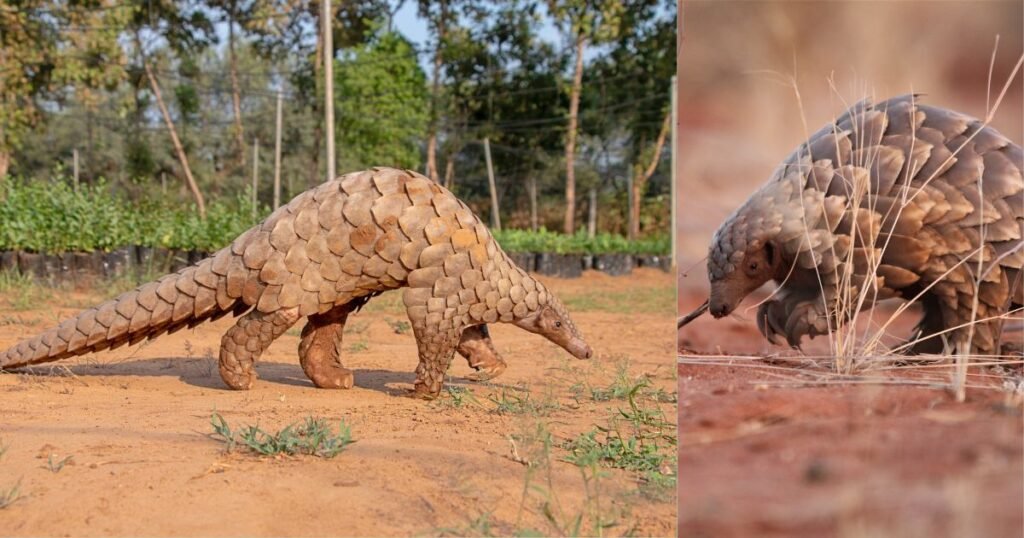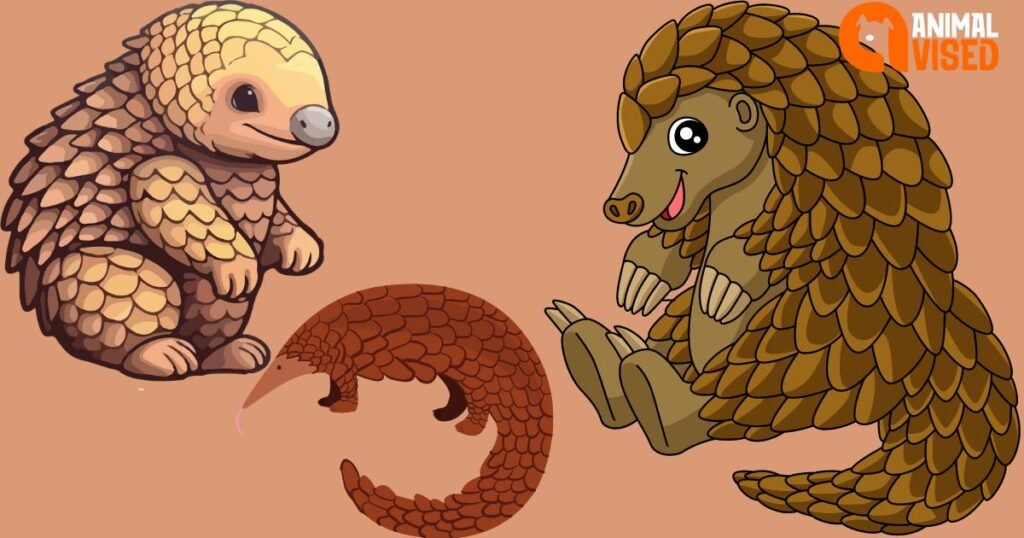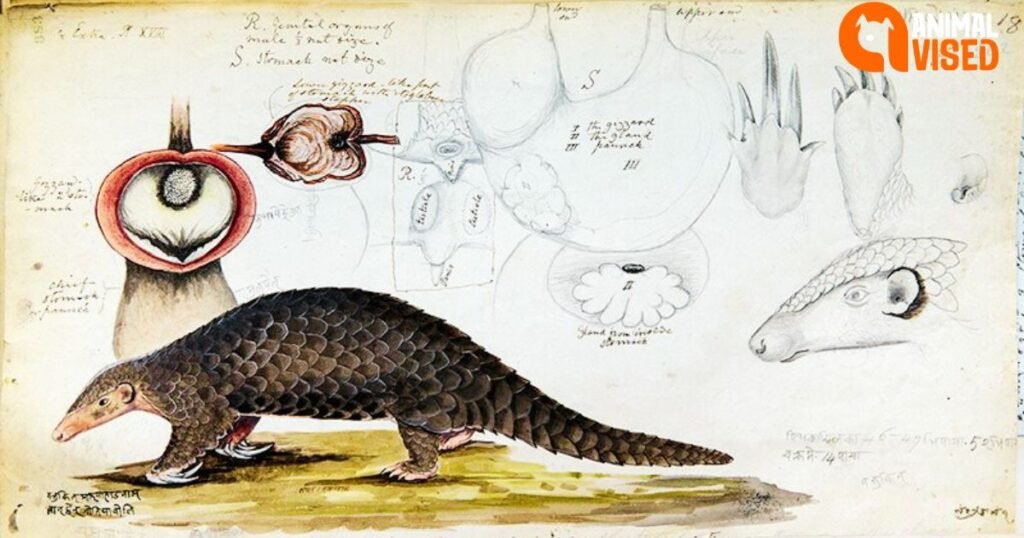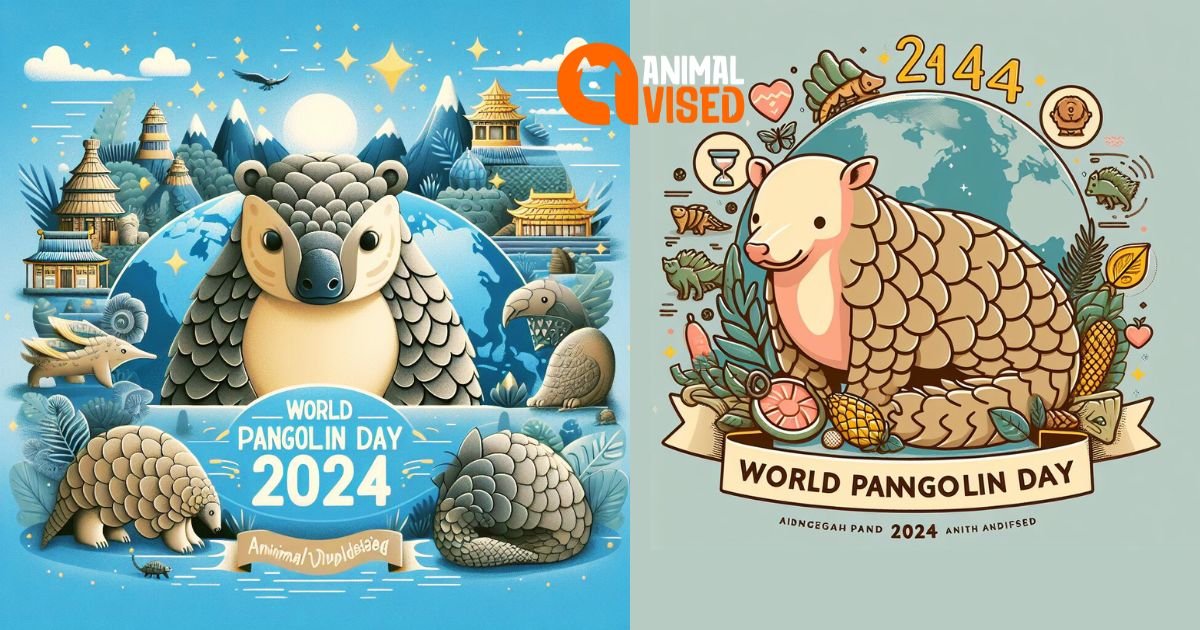Introduction:
Please mark your calendars for February 17th, 2024, because it’s World Pangolin Day! This annual event shines a light on the plight of these unique and endangered scaly anteaters, raising awareness about the threats they face and inspiring action to secure their future. Join Animal Vised as we delve into the fascinating world of pangolins and explore how you can make a difference on this important day.
Celebrating World Pangolin Day 2024 – A Spotlight on the Unique Scaly Mammal
On the third Saturday of February each year, conservation groups unite to raise awareness about one of the world’s most unique mammalian species – pangolins. World Pangolin Day 2024 falls on February 17th this year, marking another opportunity to learn about these remarkable scaly anteaters and the threats they face in the wild.
Pangolins are often called the most trafficked mammal on the planet due to excessive illegal poaching driven by demand for their meat and scales in specific cultural practices. With all eight pangolin species classified as Vulnerable, Endangered, or Critically Endangered on the IUCN Red List, World Pangolin Day aims to educate people about these elusive, gentle creatures and galvanize protective actions.
Read More: Long-Necked Dinosaurs

This year’s World Pangolin Day 2024 theme and logo revolve around the slogan “Pangolins On The Trail To Survival.” The focus highlights pathways to recovery through stronger laws, consumer awareness, habitat protection, and anti-trafficking enforcement measures across the pangolins’ native range in Africa and Asia.
From zoos hosting World Pangolin Day 2024 activities to online Q&As with leading pangolin researchers, there are many ways to get involved on February 17th! Let’s start by learning more about pangolins themselves as we gear up for this important annual observance.
What is a Pangolin?
Pangolins are mammals, but their unusually scaly physical appearance makes them look prehistoric and reptilian. In fact, pangolins represent just a handful of mammals that possess scales made of keratin. The same protein forms human hair and nails.
Known as “scaly anteaters,” pangolins use their sticky tongues up to 16 inches long to feed on ants and termites in the wild. They also use their impressive front claws to dig out insect nests and quickly uncover food sources.
The scales covering a pangolin’s body give it an armadillo-esque defense mechanism from predators. When threatened, pangolins can easily roll up into an impenetrable ball, with the sharp scales acting as formidable armor.
There are eight existing pangolin species split across two groups:
Four African pangolin species:
- Tree pangolin
- Giant pangolin
- Long-tailed pangolin
- Ground pangolin
Four Asian pangolin species:
- Philippine pangolin
- Chinese pangolin
- Sunda pangolin
- Indian pangolin
Pangolins range significantly in size and appearance depending on the species. The smallest is just over one foot long. At the same time, the gigantic giant pangolins found in equatorial Africa can stretch to over 6.5 feet!
These unique mammals have survived virtually unchanged for over 80 million years. Despite their prehistoric looks and relatively solitary and shy natures, pangolins are essential in their natural habitats as efficient insect controllers.
Discovering New Pangolin Species
In the 1990s, scientists determined that an evolutionary split required reclassifying pangolins into two groups of African and Asian species. Previously, it was commonly believed there were only 7 pangolin species across both continents.
Genetic evidence and physical features revealed that the Sunda pangolin found in Southeast Asia was distinct enough to be classified as its eighth pangolin species in 1993.
Could other undocumented new pangolin species be lurking in dense forests and brushlands? More research and field studies may very well uncover additional subspecies or evolutionary branches of pangolins in the years ahead.
After all, just over 20 years ago, a new species of mammal nicknamed the “unicorn” was discovered in the jungles of Vietnam in 1992. Large mammal species can remain shrouded even in modern times when deforestation and human encroachment are extensive across many pangolin habitats.
Why Are Pangolins So Heavily Trafficked?
Unfortunately for the future prospects of pangolin survival, their uniqueness has worked against them in many regards. Poachers driving the global pangolin trafficking trade capitalize on niche superstitious beliefs along with luxurious culinary demands surrounding pangolins.
Cultural Beliefs
Erroneous myths state that consuming pangolin scales and blood offers medicinal benefits like increasing blood circulation, enhancing fertility, improving lactation for nursing mothers, and promoting overall well-being. There is no scientific evidence to validate these supposed pangolin scale healing properties.
Epicurean Uses
On the culinary front, the soft, tender pangolin meat is considered a luxury protein source in certain regions, particularly China and Vietnam. From restaurant consumption in cities to rural bushmeat sustenance hunting, the pangolin meat trade perpetuates poaching across Africa and Asia.
Fashion & Ornamentation
When pangolins roll up into a defensive posture, their overlapping scales exhibit an appealing pattern and shapes. This has sadly led pangolin scales and even whole pangolin bodies to become coveted items for fashionable accessories like handbags, shoes, hats, belts, and jewelry. Their scales have also been used to make decorative bowls and ornaments.
To satisfy these misguided cultural demands spanning centuries, pangolins have been plucked from their natural habitats at unsustainable rates despite protective legislation. Over one million pangolins are estimated to have been poached from the wild over the past decade for trafficking purposes.

Conservation Efforts to Save Pangolins
As pangolin populations dwindle under intense poaching pressures, the remaining species teeter even closer to extinction. Fortunately, focused conservation efforts are underway on multiple fronts to try to curb the pangolin trafficking tragedy.
Awareness Campaigns
Events like World Pangolin Day help raise the public profile of pangolins using eye-catching educational campaigns. Engaging schools, universities, community groups, and the media spread accurate information about pangolins and increases sympathy for preserving them in the wild. Promoting pangolins also combats apathy over their extinction risks.
Anti-Trafficking Laws
Most nations have now passed laws outlawing the poaching, trafficking, possession, or sale of pangolins and their scales as awareness grows. However, such wildlife crime law enforcement must be more consistent or lax in many pangolin home range areas. Lobbying efforts push for stronger poaching deterrents and punishments for convicted traffickers.
Pangolin Rehabilitation
When undercover operations successfully seize illegally trafficked pangolins, experienced rescuers and wildlife rehabilitation centers provide medical care and housing for the abused animals. If possible and safe, rehabilitated pangolins are candidates for rerelease back into secure habitats to bolster wild populations.
Global Protection Status
In 2016, the Convention on the International Trade in Endangered Species (CITES) voted to ban international trade involving all eight pangolin species completely. This highest possible protected status and unified restrictions set by 183 member countries aimed to defray pangolin trafficking. While a positive action, domestic poaching and black market sales persist despite the CITES uplisting. More efforts are still needed.
Protected Park Zones
Another critical strategy is setting aside natural reserves and parks for pangolins to live undisturbed and breed safely. But habitat loss from deforestation, agricultural development, and mining operations continues to fragment and eliminate pangolin homes at alarming rates. Managing protected zones properly with adequate funding and security requires constant monitoring.
Pangolin conservation relies on a three-pronged approach of consumer demand reduction, legal trade crackdowns, and protected habitat preservation. If all stakeholders unite behind these goals, we can give the pangolins’ trail to survival a more hopeful direction.
World Pangolin Day 2024 Activities
How can you join in to raise awareness for these endearing scaly mammals on February 17th this year? World Pangolin Day 2024 activities organized by zoos, environmental groups, and online communities give everyone a chance to participate! Here are some of the ways the unique pangolin species will be highlighted:
Special Zoo Exhibits
Accredited facilities that house pangolin species plan to hold special presentations, tours, and interactive encounters over World Pangolin Day weekends. Watch pangolins enjoy snacks of live insects or have zookeepers answer questions about pangolin physiology and behavior during educational talks.
Fundraising Events
Many pangolin conservation groups organize donation drives and creative fundraising events around this time each year. From bake sales to walkathon step pledges, every bit of funding collected goes towards protecting pangolins through habitat monitoring, research, lobbying, and awareness efforts.
Art Showcases
There’s no better way to increase appreciation for pangolins than by highlighting their unique aesthetic features through art displays! These armored mammals with expressive faces and scaly patterns offer endless inspiration for artists working across all mediums. Look for pangolin-themed gallery openings, art auctions, and exhibits.
Social Media Takeovers
Throughout World Pangolin Day 2024, conservation leaders and pangolin researchers will be taking over widespread nature accounts on social media to directly engage with the public. You can send in pangolin questions to be answered via Reddit AMAs or live-streamed interviews on Instagram and Facebook as experts provide updates on the latest pangolin news and discoveries.
Virtual Tours
While still a rarity in most zoos, several conservation organizations host live pangolins at their rehab facilities or embedded field sites. Join in on live stream tours led by staff giving you an up-close and behind-the-scenes look at the pangolins in their care. During these exclusive virtual tours, learn about their individual personalities, rehabilitation treatment, and release processes.
Movie Screenings
Several influential films and documentaries centering on pangolins have been produced in recent years, such as “The World’s Most Wanted Animal.” For World Pangolin Day 2024, local zoos, student environmental clubs, and conservation groups often hold public screenings followed by panel discussions with pangolin experts. You may even spot new pangolin film projects debuting!
Student Projects
Schools frequently assign research projects and activities focused on pangolins leading to World Pangolin Day each February. Science classes can dissect insect specimens to demonstrate how pangolins feed, art classes sculpt pangolin figures from paper mache or clay, and environmental groups sell pangolin merchandise to raise money. It’s a great way to increase awareness for pangolins at a formative age!
Pangolin Photography Contests
With so few pangolins remaining in the wild, professional photography contests on World Pangolin Day reward gifted nature shutterbugs who capture striking images of these elusive mammals. Judging criteria focuses on portraying pangolins behaving naturally, embodying their unique features and details, and conveying the conservation need to save them from extinction.
Whether learning through videos and literature or encountering pangolins in person at special exhibits, World Pangolin Day 2024 aims to cement the importance of protecting pangolins in more people’s minds and hearts around the globe.
How You Can Help Pangolins
Not near any World Pangolin Day activities taking place? You can still quickly get involved from home to benefit pangolin survival! Show your support for this extraordinary creature in simple but meaningful ways like:

Shop Responsibly
Avoid purchasing any products suspected of containing pangolin scales, parts, or derivatives. Given the impossible task of determining if items like traditional Asian medicine or exotic leather products come from legal sources, it’s safest to decline when in doubt. Fashion accessories or decor made from other animal parts may also be pangolin-derived.
Reduce Insect Use
Avoid using toxic chemicals and pesticides around your home or garden. Pangolins play a vital role in controlling insect populations through their feeding behaviors. Embrace their natural pest control services using environmentally-friendly gardening instead of harmful insect reduction.
Donate to Conservation
Numerous accredited non-profit organizations fund pangolin conservation initiatives across Africa and Asia through public donations. The World Wildlife Fund has national chapters you can contribute to, or look for other widely recognized groups like Save Pangolins or the Pangolin Specialist Group under the IUCN. Every dollar helps aid pangolins’ future survival.
Support National Parks
When traveling abroad, visit protected nature reserves and parks that provide safe habitats for pangolins. Ecotourism dollars encourage habitat expansions over industrial development that destroys existing pangolin homes. Choose tours and hospitality providers that adhere to ethical animal observation standards.
Amplify Awareness
Simple actions like sharing informative pangolin posts, videos, and news articles across your personal social media platforms help expand educational messaging around World Pangolin Day. Join Thunderclap campaigns or change your profile banners to amplify pangolin conservation awareness in your own circles of influence!
Report Suspicions
If you spot suspicious pangolin scale trades or suspect local pangolins face poaching threats, report your concerns immediately to authorities. Wildlife crime hotlines and online portals exist in many nations to allow the public to confidentially notify conservation enforcement officials about pangolin issues.
There are endless creative ways to rally behind pangolin appreciation and protection efforts! Just think of how your time, talents, or funds could best positively impact these quirky little mammals on this annual day, highlighting their significance.
World Pangolin Day 2024 Quotes
To help spread awareness about the plight of pangolins on social media or within your local community, refer to these impactful and inspirational World Pangolin Day 2024 quotes:
“For the world’s most trafficked mammal – pangolins have remained the most elusive to everyone’s gaze. On this World Pangolin Day, let’s pull them out of anonymity and make their peculiar presence felt in our minds and hearts!” – Spoken by conservationist Sarita Subramaniam.
“Pangolins are to the insect world what sharks are to the fish world: consummate consumers of a protein source that others find difficult to access.” – Pangolin expert and biologist Jonathan Baillie.
“These solitary, nocturnal animals being pushed to the brink of extinction – all for the sake of bodyparts used in traditional medicine – is an obscenity.” – Said filmmaker Katie Nye, who produced the documentary “The World’s Most Wanted Animal,” focusing on pangolins.
“Though pangolins have been roaming the Earth for 80 million years, the race is on to ensure they don’t disappear during our generation’s watch.” – Quote by Paul Thomson, co-founder of the Pangolin Reports conservation group.
“I have learned that a whole community has to be behind conservation for it to be successful,” said Thai van Nguyen, founder of Save Vietnam’s Wildlife, who works extensively with pangolins.
“No human has ever seen a truly wild pangolin birth. That’s how rare and reclusive they are. We must find ways to keep them from driving them extinct,” stated renowned primatologist Jane Goodall, advocating for pangolin protection.
Use these simple yet powerful quotes from noted voices in conservation to help raise awareness for pangolins leading up to and throughout World Pangolin Day 2024. Their compelling words capture why we must appreciate and preserve this ancient species.
World Pangolin Day 2024 Dates
To help maximize promotion for pangolin conservation over the extended holiday weekend, World Pangolin Day 2024 officially kicks off on Friday, February 16th. It continues through Monday, February 19th, with various events and campaigns throughout those dates.
However, the primary World Pangolin Day 2024 date being observed by groups worldwide is set for the third Saturday in February – making February 17th, 2024, the critical date to watch for significant pangolin awareness initiatives and celebrations across communities.
Here are some of the national and international World Pangolin Day 2024 activities happening over this extended weekend timeframe in February:
February 16th
- Uganda Wildlife Authority hosting school educational visits
- Virtual pangolin tour of Thailand wildlife rescue facilities
- Student pangolin art contest submissions are due in Mumbai
February 17th
- Pangolin Run/Walk charity 5K races held in Singapore, Taipei, and Seattle
- Pangolin video gaming tournaments in the UK to raise money
- Denver Zoo offers free admission for “Pangolin Pride Day.”
February 18th
- Jane Goodall is leading a global youth webinar about pangolin protection
- Philadelphia Zoo’s “Pangolin Pandemonium” family event with games and giveaways
- Bangladesh village hosting anti-poaching community speakers
February 19th
- Finale of the Online Pangolin Film Festival highlighting new documentaries
- Environmental student clubs in Hong Kong hosting scaly anteater arts/crafts
- Fundraising deadline for Pangolin Crisis Fund donation matching challenge
As you can see, a wide array of exciting pangolin-related happenings will be taking place across the extended weekend for World Pangolin Day 2024! No matter where you reside, make an effort to join in at least one local activity, event, or digital campaign to show your support for pangolins during these commemorative dates.
The Future of World Pangolin Day
While World Pangolin Day has successfully raised the global profile around pangolins and their looming extinction risks in recent years, more widespread recognition and action are still crucial.
The day started as a small-scale observation launched by two NGOs in 2011 – the Annamiticus Conservation Organization and the Pangolin Specialist Group under the International Union for Conservation of Nature (IUCN).
World Pangolin Day 2024: Theme and Significance:
World Pangolin Day adopts a specific theme to guide its global campaign each year. While the official theme for 2024 hasn’t been announced yet, previous themes have focused on issues like scaling up law enforcement against poaching and celebrating the unsung heroes working to save pangolins. As we await the official theme, remember that every year serves as a crucial reminder of the urgent need to protect these vulnerable creatures.
Spotlight on the Scaly Stars: Pangolin Facts and Species:
Did you know pangolins are the only mammals entirely covered in scales? These fascinating creatures come in eight species, four found in Africa and four in Asia. Sadly, all eight species are classified as threatened or critically endangered, primarily due to rampant poaching for their scales. They are mistakenly believed to hold medicinal properties despite no scientific evidence. Learning about these unique animals is crucial to fostering empathy and inspiring conservation efforts.
World Pangolin Day 2024: Activities and Actions:
There are numerous ways to participate in World Pangolin Day 2024 and contribute to their conservation:
- Spread awareness: Share informative articles, social media posts, and images about pangolins using the hashtag #WorldPangolinDay. This simple act can reach a broad audience and educate others about these remarkable creatures.
- Organize a local event: Partner with schools, wildlife organizations, or community groups to hold educational events, fundraising campaigns, or art contests highlighting pangolins. The more people involved, the more significant the impact!
- Support conservation efforts: Donate to reputable organizations working tirelessly to protect pangolins and their habitats. Every contribution, big or small, makes a difference.
- Demand sustainable practices: Choose products demonstrably free of pangolin parts and advocate for stricter regulations against the illegal wildlife trade. Your responsible choices can send a powerful message.
Unveiling Hope: Quotes to Motivate Pangolin Conservation:
“The fight for pangolins is a fight for our planet’s biodiversity and a reminder that we must stand united to protect all vulnerable species.” – Dr. Luke Dollar, Pangolin Specialist Group
“Every pangolin scales the mountain of extinction, clinging to hope. It’s our duty to offer a helping hand and ensure their survival.” – Jane Goodall, Chimpanzee Conservationist

“Together, we can turn the tide against pangolin poaching and celebrate the beauty and wonder of these incredible creatures.” Animal Vised Team
Beyond World Pangolin Day:
While World Pangolin Day 2024 offers a dedicated platform for advocacy, remember that every day is an opportunity to make a difference for pangolins. By incorporating sustainable practices, supporting conservation efforts, and actively educating others, we can collectively rewrite the narrative for these unique animals and ensure their scales tell a story of survival, not extinction.
The Future of World Pangolin Day (continued)
As pangolin poaching stories gained media coverage over the past decade, World Pangolin Day gradually gained more traction and participation year after year. Zoos, conservation groups, student clubs, and individual supporters began hosting creative events and digital campaigns under the World Pangolin Day umbrella.
Still, there is a need to make this wildlife celebration and call for pangolin protection even more significant and louder internationally. Key goals moving forward include:
Official Recognition
While the Convention on International Trade in Endangered Species (CITES) officially sanctions World Pangolin Day, the next step is pursuing proclamations from significant world organizations and national government bodies.
Having World Pangolin Day officially enshrined by the United Nations, the World Wildlife Fund, individual national wildlife agencies, and prestigious zoological institutions would elevate its stature and importance exponentially.
Corporate Sponsorships
Securing lucrative corporate sponsorships from major brands would inject significant promotional funding into World Pangolin Day. These big-budget marketing dollars could support higher-quality multimedia campaigns using celebrities and influencers to reach billions.
Multinational companies focused on sustainability, ecotourism, pet products, conservation technologies, and others stand to benefit from positive brand associations with World Pangolin Day. Strategic partnerships need to be nurtured.
Expansion Into Academics
There’s an opportunity to make World Pangolin Day an annual focus within educational curricula for students of all ages around the globe. Classroom activities, campus events, guest lectures, and more could make pangolin conservation studies a recurring fixture.
Partnering with educational associations, professional development groups, online learning platforms, and established academic institutions expands World Pangolin Day exposure among the next generation.
Global Broadcasting
While currently limited to local community initiatives, the future could see World Pangolin Day achieve worldwide mainstream media saturation akin to events like Earth Day. Publishing special newspaper editions, securing morning show appearances, producing primetime nature specials, and organizing live-streamed global concerts are all possibilities with expanded promotion and broadcasting access.
Year-Round Engagement
The most significant opportunity for World Pangolin Day’s evolution may be transitioning from a single-day observation into a yearlong pangolin conservation movement. Maintaining consistent public engagement through monthly actionable tips, seasonal campaigns, and sharing poaching incident updates could perpetuate the urgency for pangolin protection at a fever pitch.
Only by uplifting the still relatively obscure World Pangolin Day into a unifying global force will we maximize all available resources and public passion for saving pangolins from permanent extinction. The scaly anteaters need as many voices advocating for their survival as possible.
Pangolins Vs. World Hippo Day
While watching pangolins bask in their hard-earned annual day of recognition is lovely, it’s essential to keep some perspective around this whole concept of raising awareness for unique wildlife.
It may surprise some people that no formal “World Hippo Day” has been established despite hippos being much more iconic animals found in zoos worldwide. The humble pangolin has rallied significant conservation interest for its annual day before the beloved hippopotamus!
Of course, pangolins are currently at exponentially higher risk of literal extinction than common hippos. Their desperate situation deservedly makes pangolins the more urgent priority for conservationists and wildlife lovers to amplify.
Still, expect a potential grassroots “World Hippo Day 2024” movement to emerge soon enough if one civilization’s symbol can get our global attention! Hippo enthusiasts may start campaigning for their annual day of honor and activities promoting protection for the portly semi-aquatic mammals.
Pangolins had their survival day first but could always use some commonality competition from another unusual animal as motivation to keep pushing awareness even further!
Making An Impact on Pangolins
Ultimately, the true success and significance of World Pangolin Day each year comes down to whether it directly enables positive conservation impacts that tangibly protect pangolins from extinction.
While festivals, student projects, zoo exhibits, and viral videos are beautiful ways to immerse people in learning more about these remarkable scaly mammals, fundamental substantive changes must occur. This includes:
- Reducing consumer demands that make pangolin poaching lucrative
- Strengthening law enforcement capabilities to catch illegal traffickers
- Establishing more secure protected habitats across pangolins’ native ranges
- Growing sustainable wild pangolin population numbers through rehabilitation
When we see those sorts of measurable wins start accumulating year after year, then we’ll know World Pangolin Day’s existence truly makes an enduring difference.
No rainforest creature should disappear from our planet due to human greed and apathy. Not on our watch! Taking localized actions while amplifying pangolins’ plight through World Pangolin Day gives these unique mammals a fighting chance at survival.
Cherish your opportunities to observe, learn about, and advocate for pangolins this February 17th, 2024, and every subsequent year. With some luck and perseverance, we may celebrate the day when these peculiarly prehistoric-looking anteaters no longer rank as the most trafficked mammals plagued by poaching dangers.
Appreciate and protect pangolins today so future generations can experience one of evolution’s longest-surviving species! Participate in World Pangolin Day activities to give these scaly oddballs a path forward into the centuries ahead.
Dive Deeper into the Pangolin Peril:
- Poaching Crisis: Unmask the shocking details of the illegal wildlife trade and its devastating impact on pangolin populations. Explore the drivers behind poaching, from traditional medicine myths to organized crime, and highlight ongoing efforts to combat it.
- Habitat Loss: Delve into the threats posed by deforestation, agriculture expansion, and infrastructure development to pangolin habitats. Explain how habitat loss fragments populations, restrict vital resources and increases vulnerability to poaching.
- Climate Change: Discuss the emerging risks of climate change for pangolins, such as altered food availability, disrupted migration patterns, and increased disease susceptibility. Share how climate action benefits not only pangolins but the entire ecosystem.
Celebrating Biodiversity Champions:
- Unsung Heroes: Feature the inspiring work of dedicated conservationists, researchers, and communities who tirelessly fight for pangolin survival. Showcase their innovative projects, rehabilitation efforts, and educational initiatives.
- Pangolin Guardians: Highlight the crucial role of local communities in protecting pangolins and their habitats. Explore traditional knowledge, cultural beliefs, and collaborative conservation programs that empower communities to become stewards of these valuable creatures.
- Technological Advancements: Share how technology aids pangolin conservation, from using camera traps to monitor populations to DNA analysis to identify poached scales. Discuss the potential and limitations of these advancements.
Beyond Awareness: Actionable Steps:
- Sustainable Shopping: Offer practical tips for making informed choices as a consumer and avoiding products potentially linked to the pangolin trade. Provide resources for identifying sustainable brands and responsible companies.
- Dietary Choices: Explore the potential impact of unsustainable insect farming practices on pangolin prey availability. Discuss alternative protein sources and mindful consumption habits that promote biodiversity conservation.
- Travel Responsibly: Guide readers towards ecotourism initiatives that support pangolin conservation efforts and encourage responsible travel practices that minimize environmental impact.
Spark Curiosity and Ignite Conversation:
- Myths and Misconceptions: Debunk common myths surrounding pangolin scales and their medicinal properties. Explain the lack of scientific evidence and emphasize the harm caused by such misinformation.
- Pangolin Folklore and Symbolism: Explore the cultural significance of pangolins in different regions, highlighting their presence in myths, folktales, and traditional art. Discuss how these cultural connections can be leveraged for conservation awareness.
- Engaging Activities for Kids: Provide fun and educational activities for children and families to learn about pangolins and celebrate World Pangolin Day. Ideas include creating pangolin artwork, organizing a fundraising bake sale, or participating in online educational games.
Amplify Your Voice:
- Petition Power: Share links to reputable petitions advocating stricter regulations against pangolin poaching and habitat destruction. Encourage readers to sign and share these petitions to amplify their voices for change.
- Contact Policymakers: Provide resources and guidance for contacting local and national government officials to urge them to prioritize pangolin conservation and support relevant policies.
- Social Media Advocacy: Offer engaging social media content ideas and relevant hashtags to encourage readers to spread awareness and inspire action on World Pangolin Day.
Inspire Hope for the Future:
- Success Stories: Showcase examples of successful pangolin conservation projects that have demonstrably helped stabilize populations or improve their wellbeing. wellbeingories of rescued pangolins released back into the wild and celebrate these victories.
- Future Outlook: Discuss ongoing research and conservation efforts that offer hope for the future of pangolins. Highlight advancements in anti-poaching technology, habitat restoration initiatives, and educational programs that empower communities.
- Empowering Message: Conclude your blog post with hope and empowerment. Encourage readers to believe in the collective power to make a difference, regardless of their individual contribution. Remind them that every action, even seemingly minor, has the potential to ripple out and positively impact the future of pangolins.
Celebrating World Pangolin Day 2024: Unveiling the Mysteries of the Pangolin
Welcome to Animal Vised, your trusted source for all animal-related things. Today, we will delve into the fascinating world of pangolins in honor of World Pangolin Day 2024.
World Pangolin Day 2024 Theme
The theme for World Pangolin Day 2024 is “Protecting Pangolins: Our Shared Responsibility.” This theme emphasizes the collective effort required to ensure the survival of these unique creatures.
World Pangolin Day 2024 Logo
The logo for World Pangolin Day 2024 features a stylized image of a pangolin, symbolizing the beauty and uniqueness of this species. The logo serves as a reminder of our duty to protect these creatures from threats such as poaching and habitat loss.
World Pangolin Day 2024 Activities
World Pangolin Day 2024 is filled with activities to raise awareness about pangolins. These include educational workshops, conservation talks, and online campaigns. Participating in these activities is a great way to contribute to the cause.
World Pangolin Day 2024 Quotes
Here are some inspiring quotes for World Pangolin Day 2024:
- “In our hands lies the fate of the pangolin. Let’s protect, not neglect.”
- “Every pangolin saved is a step towards a balanced ecosystem.”
World Pangolin Day 2024 Dates
World Pangolin Day is celebrated on the third Saturday of February each year. In 2024, it falls on February 17th.
International World Pangolin Day 2024
International World Pangolin Day 2024 is a global event that unites people worldwide in the fight to save pangolins. It’s a day to celebrate these fantastic creatures and raise awareness about their plight.
New Pangolin Species
Recent research has led to the discovery of a new pangolin species. This discovery highlights the need for continued research and conservation efforts to protect these unique creatures.
World Hippo Day 2024
While our focus today is on pangolins, remember other endangered species. World Hippo Day 2024, celebrated on February 15th, is another important date on the conservation calendar.

Read More: World Pangolin Day
FAQs
What is a pangolin?
A pangolin is a scaly, ant-eating mammal in parts of Africa and Asia. They are often called the “world’s most trafficked mammal” due to illegal poaching for their scales and meat. All eight pangolin species are threatened with extinction.
When is World Pangolin Day celebrated?
World Pangolin Day is annually observed on the third Saturday of February. For 2024, it falls on February 17th.
Why is World Pangolin Day important?
This annual event aims to raise global awareness about the threats pangolins face from poaching and habitat loss. Its goal is to galvanize conservation efforts and protective actions to save pangolins from extinction.
What is the theme for World Pangolin Day 2024?
The theme is “Pangolins On The Trail To Survival,” highlighting pathways to recover pangolin populations through anti-trafficking laws, consumer education, habitat protection, and enforcement.
What types of events happen on World Pangolin Day?
Typical events include zoo exhibits, fundraisers, art shows, virtual tours, movie screenings, photography contests, student projects, and social media campaigns focused on pangolins.
How can I get involved with World Pangolin Day?
Participate in local events, donate to pangolin conservation groups, avoid products containing pangolin parts, report suspected poaching, and spread awareness by sharing facts and imagery online.
Why are pangolins so heavily trafficked?
Misguided cultural beliefs claim their scales have medicinal properties, their meat is a delicacy, and their scales are used in fashion accessories – driving illegal poaching.
What is being done to protect pangolins?
Efforts include:
- Anti-poaching laws.
- Rehabilitating rescued pangolins.
- Creating protected nature reserves.
- Demand reduction campaigns.
- Funding for conservation research and security patrols.
Are there different species of pangolins?
Yes, four pangolin species are found in Africa and four in Asia, varying in size from one to over six feet long. Recent genetic evidence may point to additional subspecies as well.
Will World Pangolin Day make a real impact?
Its ultimate success depends on whether the awareness raised translates into tangible reductions in consumer demand, more vigorous enforcement against traffickers, and growth in sustainable pangolin population numbers annually.










